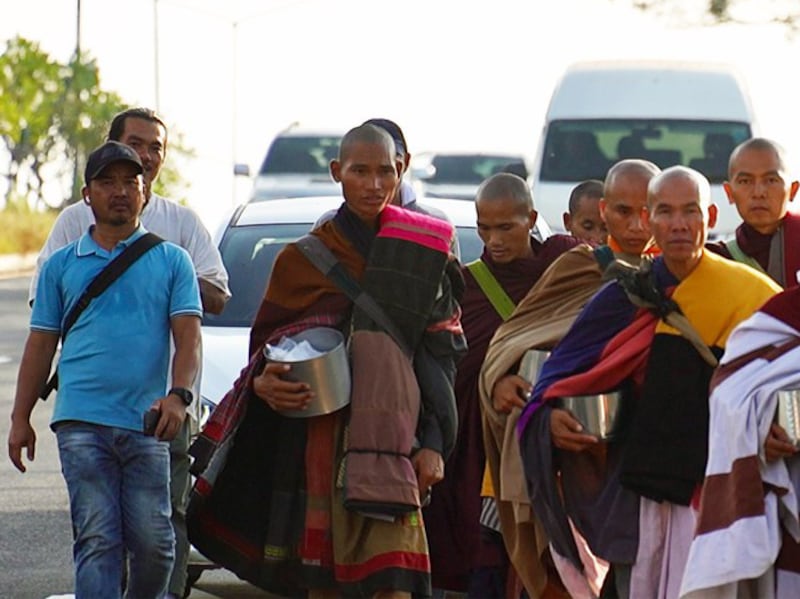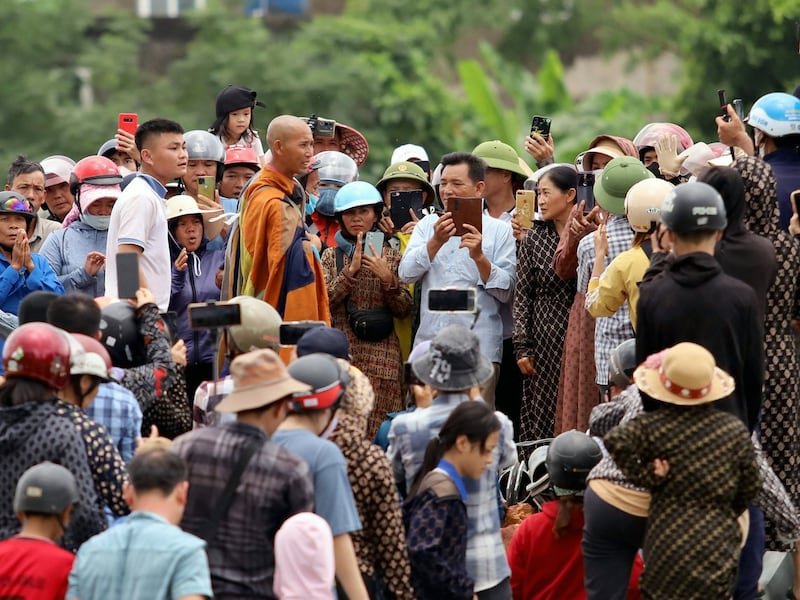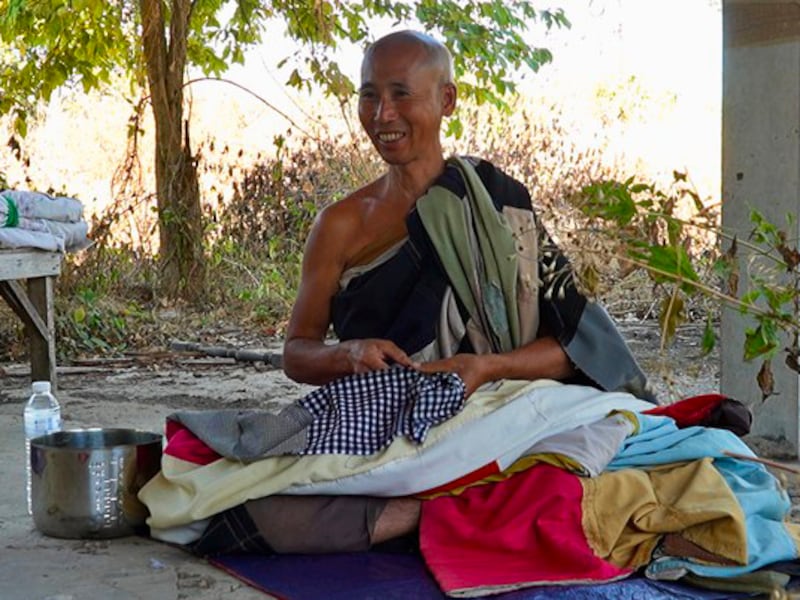Read RFA coverage of this story in Vietnamese.
As Thich Minh Tue, the Vietnamese monk who became an internet star last year, treks across Thailand on a pilgrimage to India, one man walking behind him in a black cap calls all the shots.
Doan Van Bau, a former Vietnamese security officer, says he was appointed by government authorities to be Thich Minh Tue’s bodyguard, but his role appears to be much larger than that.
Bau controls virtually every aspect of the monk’s journey.
He manages the trip’s logistics, decides who can be part of the delegation and acts as Thich Minh Tue’s press handler, determining what kinds of questions journalists can ask –- and even what the monk can say.
And anything political is clearly out of bounds.
Bau has been walking with the Buddhist monk for the past month, since Thich Minh Tue decided to embark on the 2,700-kilometer (1,600 mile) pilgrimage on foot across Laos, Thailand and Myanmar to India, the birthplace of Buddhism.
“As soon as the group came into Laos, (Bau) began exhibiting behaviors that seemed to control monk Minh Tue, such as preventing anyone from approaching the monk,” said Tuan Khanh, a musician based in Vietnam who has been writing about the monk’s journey.
“Anyone traveling from Vietnam who wanted to accompany the monk was closely monitored by Mr. Bau and finally were sent away,” he said, adding that Minh Tue no longer offers any Buddhist teachings to people he meets as he once did.
Back off
Bau’s controlling behavior was on full display when journalists from Radio Free Asia attempted to cover Minh Tue in early January as he entered Thailand, where there is more press freedom than in Laos and Vietnam.

Bau told members of the media, including RFA, to maintain a distance of 10 meters (30 feet) from the entourage, which had grown to 10 people.
Other members of the delegation prevented journalists from filming the monk by blocking their view with a truck that drove along slowly.
Bau initially agreed to let RFA interview Minh Tue as long as he could listen to the questions, but later imposed restrictions on the nature of the questions.
“I have a rule: No political questions. Only questions about culture and people are permitted,” Bau said. “If we don’t control the information, it could harm us. Things aren’t that simple.”
Bau later asked to film RFA reporters promising to send articles and videos for approval before publication.
When they objected, Bau asked them to leave.
Minh Tue, who was nearby, tried to smooth things over.
“I’ll only say what I know, so there won’t be any problems,” the monk said. “Let them do it.”
But Bau stood firm.
“The master might say one thing but you could edit and publish it differently,” he said. “If I can’t control the content, I won’t let you do the interview.”
Internet hero
Thich Minh Tue – “Thich” means “monk” – became a household name last May in Vietnam during hias barefoot trek across the country. His simple lifestyle and adherence to Buddhist precepts -– he carries a rice cooker for alms – gained him a following among social media influencers and ordinary people alike.
Although not officially recognized as a monk by the state-sanctioned Buddhist organization, Minh Tue’s earnestness won him respect in Vietnam, a traditionally Buddhist nation where the communist government imposes strict limits on religious practice and expression.

But authorities became alarmed at his fame, and in June they raided his camp. A couple months later, Minh Tue announced on a government committee website that he had “voluntarily retired.”
Then in November, the monk announced plans to travel on foot to India.
Who is Doan Van Bau?
On his personal YouTube channel, Bau described himself as a retired security officer and an active Communist Party member.
He previously held the rank of senior colonel and served as director general of the Political Theory Division within the Central Propaganda and Education Department.
RELATED STORIES
EXPLAINED: Why is an internet-famous monk on a trek to India?
Vietnamese followers of ‘barefoot monk’ question call for social media silence
Vietnamese monk leaves Laos, enters Thailand
In early posts on YouTube, Bau described himself as a “retired ordinary citizen” volunteering to assist Minh Tue in his pilgrimage, saying he had a deep respect for the monk’s commitment to Buddhism.
In December, Minh Tue said in one of Bau’s YouTube videos about trip preparations posted that he only asked Bau to handle the immigration procedures on the way to India.
But in more recent comments on social media, Bau said the Vietnamese government had issued official documents assigning him to be the “head of the delegation.”
In another Facebook video on Jan. 7, Bau told Thich Minh Tue that while he has “no objections” to his “self-cultivation,” he hoped the monk “will not interfere with my planning, organization or management of the delegation.”
Bau has since rejected at least three people from joining the pilgrimage, including two monks.

Even before the pilgrimage started, officials appeared to be controlling the endeavor.
A document released on Dec. 1 by Phat Tam Thien Dinh Tue Ltd., a company founded by Thich Minh Tue’s elder brother, listed 10 individuals authorized by the monk to accompany and assist him during the pilgrimage to India.
But on the departure day, only two of them -- Bau and Le Kha Giap – were officially allowed to join the delegation.
Media blackout
Bau is live-streaming the monk’s journey on YouTube – which many people in Vietnam are following – but the country’s state-run media has had no coverage of the entourage.
Vietnamese journalists told RFA that the propaganda department has told them not to publish any news about it.
After about a week of walking in Thailand, Bau said on his personal social media account that the delegation had many “adversities” in the journey so far, including foreign reporters and others observing the pilgrimage.
As Thich Minh Tue heads toward Bangkok, Bau continued to keep a tight lid on the monk’s interactions, particularly with the media.
“Bau has always spoken on behalf of the monk, taking over his right to communicate,” said Tuan Khanh, the musician who has been monitoring the pilgrimage closely. “The monk no longer has the opportunity to speak.”
Translated by Anna Vu. Edited by Kiana Duncan and Malcolm Foster.
